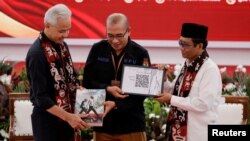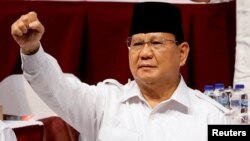Two of Indonesia's three presidential hopefuls told U.S. investors on Tuesday they would address issues surrounding doing business in the Southeast Asian country.
Former Central Java Governor Ganjar Pranowo told an event hosted by the American Chamber of Commerce that he would ensure legal certainty for foreign investors and boost tax collection in the trillion-dollar economy.
Anies Baswedan, the former governor of the capital Jakarta, promised to maintain Indonesia's policy credibility by giving major posts to technocrats and to bolster investment in the manufacturing industry if he wins the Feb. 14 election.
"Illegal fees must be eradicated, services must be made cheaper, faster. We must provide legal certainty by enforcing the law," said Ganjar, who narrowly trails front-runner Prabowo Subianto in surveys, adding that certainty issue ranks among investors key' concerns.
Ganjar has promised to boost the average growth of Southeast Asia's largest economy to 7% if he wins the next five-year presidential term. U.S.-educated Anies targets 5.5% to 6.5% growth on average.
Indonesia's economy grew 5.3% last year, boosted by the commodity upcycle, but with commodity prices falling growth is expected to ease to around 5% this year.
Ganjar vowed to improve governance in the tax office to double the government's spending capacity, without giving details.
Anies offered plans to create at least 14 new economic growth centers outside of the main Java island.
Prabowo, the defense minister, did not attend the American Chamber of Commerce event. He is expected to officially register his candidacy to the election commission on Wednesday and has not made public his policy platform.
Elections in Indonesia are often a battle of personalities rather than policies, with candidates running on similar platforms promoting growth, jobs, and pluralism in the world's largest Muslim-majority country.
However, candidates also often promote economic nationalism when campaigning.
Incumbent Joko Widodo, who must step down after serving a maximum of two terms, has asked his successor to continue his policy of prioritizing processing natural commodities onshore.
Widodo has overseen Indonesia's 2020 export ban on nickel ore, which he followed with stopping exports of unprocessed bauxite this year.






